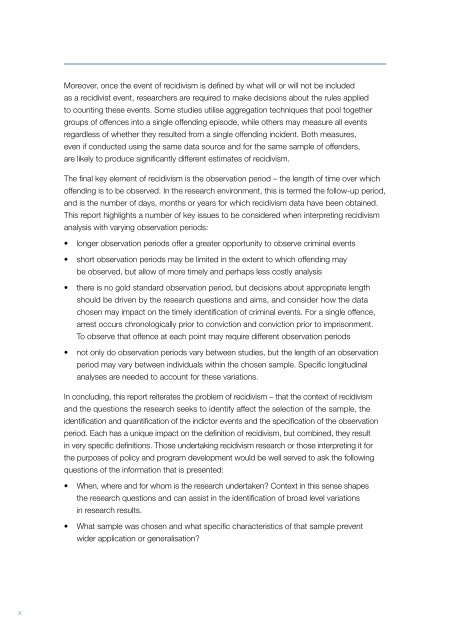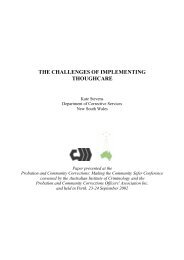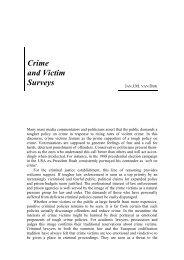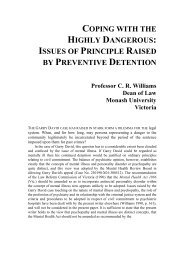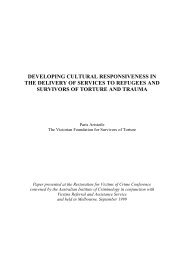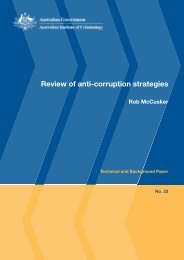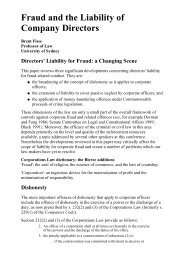Recidivism in Australia : findings and future research - Australian ...
Recidivism in Australia : findings and future research - Australian ...
Recidivism in Australia : findings and future research - Australian ...
You also want an ePaper? Increase the reach of your titles
YUMPU automatically turns print PDFs into web optimized ePapers that Google loves.
x<br />
Moreover, once the event of recidivism is def<strong>in</strong>ed by what will or will not be <strong>in</strong>cluded<br />
as a recidivist event, <strong>research</strong>ers are required to make decisions about the rules applied<br />
to count<strong>in</strong>g these events. Some studies utilise aggregation techniques that pool together<br />
groups of offences <strong>in</strong>to a s<strong>in</strong>gle offend<strong>in</strong>g episode, while others may measure all events<br />
regardless of whether they resulted from a s<strong>in</strong>gle offend<strong>in</strong>g <strong>in</strong>cident. Both measures,<br />
even if conducted us<strong>in</strong>g the same data source <strong>and</strong> for the same sample of offenders,<br />
are likely to produce significantly different estimates of recidivism.<br />
The f<strong>in</strong>al key element of recidivism is the observation period – the length of time over which<br />
offend<strong>in</strong>g is to be observed. In the <strong>research</strong> environment, this is termed the follow-up period,<br />
<strong>and</strong> is the number of days, months or years for which recidivism data have been obta<strong>in</strong>ed.<br />
This report highlights a number of key issues to be considered when <strong>in</strong>terpret<strong>in</strong>g recidivism<br />
analysis with vary<strong>in</strong>g observation periods:<br />
•<br />
•<br />
•<br />
•<br />
longer observation periods offer a greater opportunity to observe crim<strong>in</strong>al events<br />
short observation periods may be limited <strong>in</strong> the extent to which offend<strong>in</strong>g may<br />
be observed, but allow of more timely <strong>and</strong> perhaps less costly analysis<br />
there is no gold st<strong>and</strong>ard observation period, but decisions about appropriate length<br />
should be driven by the <strong>research</strong> questions <strong>and</strong> aims, <strong>and</strong> consider how the data<br />
chosen may impact on the timely identification of crim<strong>in</strong>al events. For a s<strong>in</strong>gle offence,<br />
arrest occurs chronologically prior to conviction <strong>and</strong> conviction prior to imprisonment.<br />
To observe that offence at each po<strong>in</strong>t may require different observation periods<br />
not only do observation periods vary between studies, but the length of an observation<br />
period may vary between <strong>in</strong>dividuals with<strong>in</strong> the chosen sample. Specific longitud<strong>in</strong>al<br />
analyses are needed to account for these variations.<br />
In conclud<strong>in</strong>g, this report reiterates the problem of recidivism – that the context of recidivism<br />
<strong>and</strong> the questions the <strong>research</strong> seeks to identify affect the selection of the sample, the<br />
identification <strong>and</strong> quantification of the <strong>in</strong>dictor events <strong>and</strong> the specification of the observation<br />
period. Each has a unique impact on the def<strong>in</strong>ition of recidivism, but comb<strong>in</strong>ed, they result<br />
<strong>in</strong> very specific def<strong>in</strong>itions. Those undertak<strong>in</strong>g recidivism <strong>research</strong> or those <strong>in</strong>terpret<strong>in</strong>g it for<br />
the purposes of policy <strong>and</strong> program development would be well served to ask the follow<strong>in</strong>g<br />
questions of the <strong>in</strong>formation that is presented:<br />
•<br />
•<br />
When, where <strong>and</strong> for whom is the <strong>research</strong> undertaken? Context <strong>in</strong> this sense shapes<br />
the <strong>research</strong> questions <strong>and</strong> can assist <strong>in</strong> the identification of broad level variations<br />
<strong>in</strong> <strong>research</strong> results.<br />
What sample was chosen <strong>and</strong> what specific characteristics of that sample prevent<br />
wider application or generalisation?


